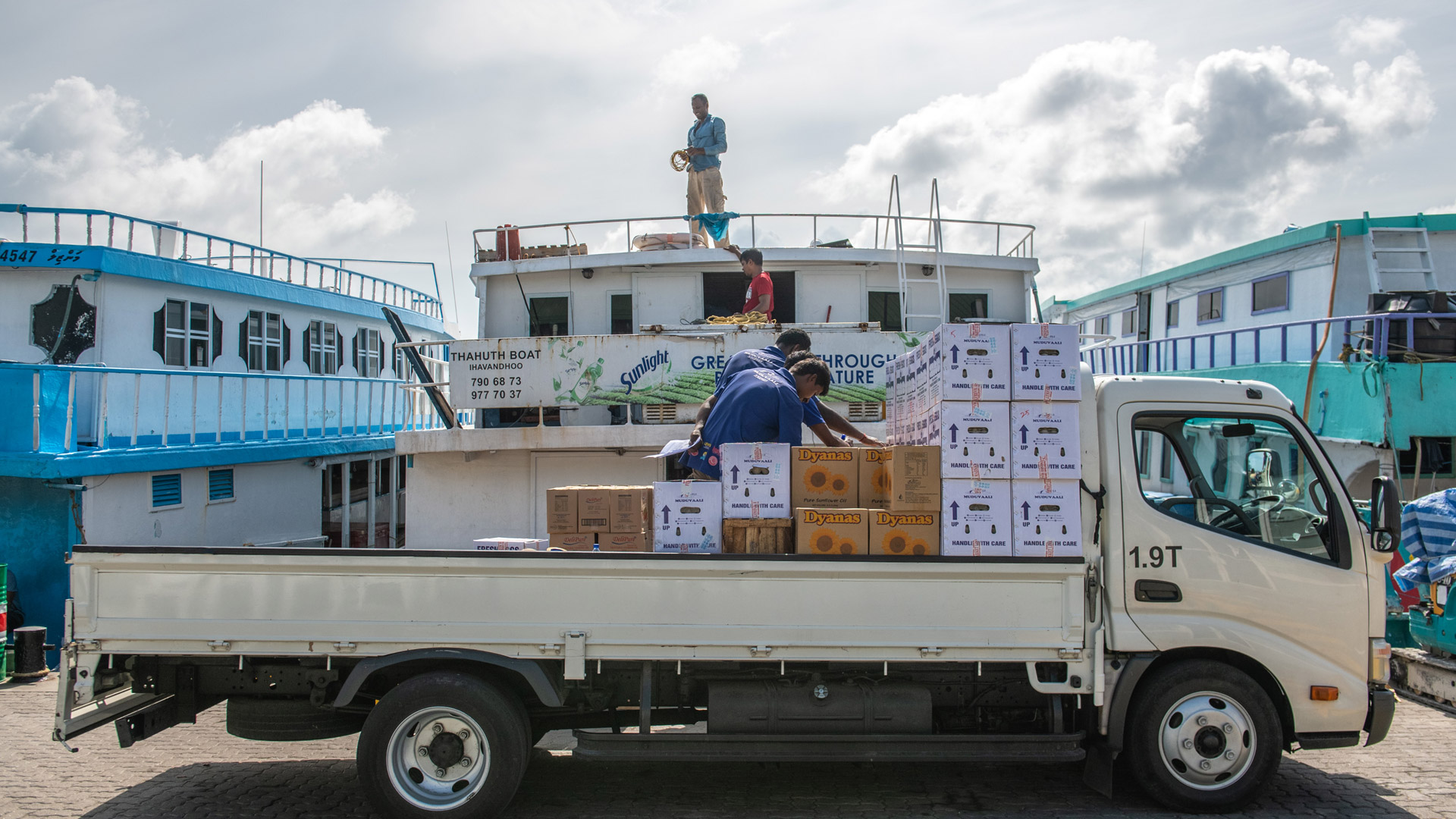A Single Window System for Efficient Cross-Border Trade
Maldives, one of the smallest countries in Asia and the Pacific by population and land area, was propelled to upper-middle-income status in 2010 by its strong tourism industry. As successful as they are, tourism and tourism-related industries present a narrow economic base for the country and its around half a million inhabitants, making it susceptible to economic shocks.
Like most SIDS, Maldives relies heavily on imports for food, fuel, and capital goods. From 1995 to 2019, imports accounted for more than 50% of gross domestic product (GDP), with a value from about $268 million to around $3 billion. Exports, primarily of fresh fish and processed fish products, increased from $50 million in 1995 to $163 million in 2019. However, as a share of GDP, exports declined from about 11% to about 3% during the same period. Improving the country’s trade environment is an essential point of intervention to expand trade, especially with India and Sri Lanka, Maldives’s major trading partners.
Trade facilitation woes
While trade is critical to its economy, Maldives lags on certain trade facilitation indicators. For example, the cost of documentary compliance per export transaction is $300, among the highest in South Asia where the average is $158. Additionally, procedural and organizational bottlenecks substantially hamper the efficient flow of trade transactions, which increases costs for traders. The high cost of border transactions is just one of the problems. The country’s “on the border” procedures are beset with challenges, including susceptibility to fraudulent trade documents, repetitive manual processes, and inadequate availability and usability of important trade information technology systems.
A presidential decree issued in September 2015 allowed the government to form the National Trade Facilitation Committee to address such issues. One of the committee’s tasks is to introduce the national single window at the border to facilitate cross-border transactions.
With cofinancing from the High-Level Technology Fund, ADB supports the South Asia Subregional Economic Cooperation National Single Window Project. The project will leverage ICT to improve Maldives’s cross-border regulatory procedures through the national single window system (NSW).
The national single window system
The single window has been a key concept for trade facilitation in the past decade. It calls for a single-entry and single-submission point, which then enables traders to comply with regulatory export and import requirements in a more efficient manner. Furthermore, single window allows coordination among different border government agencies, ensuring that trade activities and transactions are safe, legitimate, and seamless across trade and supply chains.
Maldives’s desired national single window is designed to facilitate and establish an efficient international trade environment by reducing delays and lowering costs associated with clearance of goods while maintaining the controls and collection of levies, fees, duties, and taxes on imports and exports.
Streamlined, fraud-proof procedures
Supporting the desired outcome of improved efficiency in cargo clearance, the project aims to accomplish three specific outputs:
- establish a national single window system and re-engineer Maldives’ trade processes
- enhance the capacities of relevant government and private sector actors in utilizing the single window, and
- use high-level technologies to pilot-test the national single window
The first output includes a two-phased establishment of a nationwide online system that requires all relevant parties to submit standardized information at a single-entry point to fulfill all import, export, and transit-related regulatory requirements. In the first phase, the agencies that show high readiness will be interfaced with the single window system. The rest of the cross-border regulatory agencies’ (CBRA) systems will be connected in the second phase.
The second output includes supporting the finalization of the single window framework, developing and implementing a change management and capacity development strategy, and reaching out to the private sector, including women.
The third output includes pilot testing the application of a blockchain, a high-level technology that enables users to track shipping items and record all related documentation history without a chance of falsification. In its publication that discusses paperless trade facilitation in Maldives, ADB described the blockchain technology as one that “offers immutable records of transactions and will bring required levels of trust and transparency in the trade ecosystem.” The report further described the technology as a “golden source of truth.” This is because once data is committed to the blockchain ledger, it cannot be altered at any point in time.
Ease of doing business at the border
When the project concludes, Maldives’ goals to facilitate trade and strengthen its capacity to govern by promoting advanced technologies will be achieved. The establishment of the national single window is in line with the operational priorities for trade facilitation under ADB’s South Asia Subregional Economic Cooperation or SASEC program.
Specifically, the CBRAs will be fully responsible for the operation of the national single window. The pilot-testing results will be disseminated to raise awareness among all agencies related to the NSW. The project will enable the sharing of harmonized data across CBRA systems, including the Maldives Ports Limited and the Maldives Airports Company Limited. It will also allow traders and other service providers to submit and obtain a unified clearance of export and import documentation requirements through a single point of entry.
Cost
- ADB $10.5 million
- Government Counterpart $2 million
Cofinancing Partner
- High-Level Technology Fund $500,000
Dates
Approval Date 30 May 2019
Signing Date 17 June 2019
Completion Date 31 December 2023

